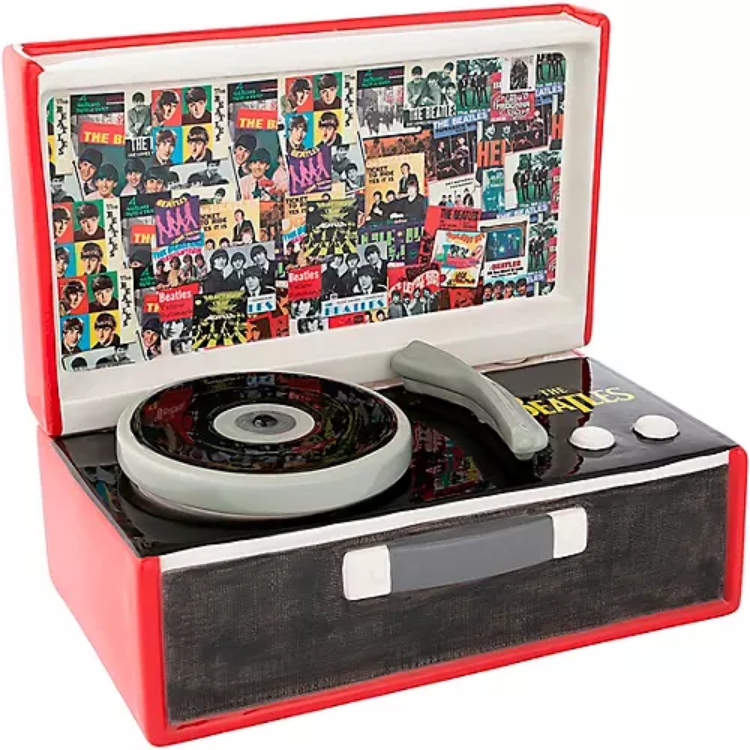- Register
- Log in to Tune-In
- Wishlist (0)
-
Shopping cart
(0)
You have no items in your shopping cart.
Beatles News
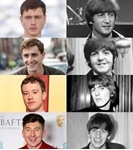
Beatlemania … in 2026?! Thanks to director Sam Mendes’s upcoming four-part Beatles film series, the Liverpool band is about to become the biggest music act in the world once again. The hubbub is certainly thanks, in large part, to its all-star cast. The Beatles films will star Paul Mescal (Hamnet) as Paul McCartney, Harris Dickinson (Babygirl) as John Lennon, Joseph Quinn (Fantastic Four: First Steps) as George Harrison, and Barry Keoghan (Saltburn) as Ringo Starr. With a lineup that good, the hysteria starts to make sense.
Fans got their first taste of the foursome through a London higher-education postcard event—which revealed the first official images of the actors as their famous counterparts. Released by the Liverpool Institute for Performing Arts (LIPA), which McCartney cofounded, the photos of Mescal, Dickinson, Keoghan, and Quinn were met with immediate excitement. I mean, it doesn’t get more spot-on than Mescal’s McCartney.
Now set photos from one of the films are leaking on social media, showing the four Beatles swarmed in New York City in the mid-’60s. Keoghan poses as Starr snapping photos, while Quinn’s Harrison attempts to trudge through the crowd to their details

Paul McCartney and John Lennon were an enviable songwriting duo when the Beatles first debuted. They became the pair against which every other rock band measured itself. Even today, bands aim to have a songwriting arm as strong as these two legends. However, that legacy was sullied by the fact that the duo fell apart towards the end of the band’s tenure.
By the time the Beatles announced their breakup, Lennon and McCartney were mainly name partners only. Their songwriting efforts were separate in every sense of the word. However, staying on the more positive side of their relationship, let’s take a look back at some of their first efforts together. One early release from the pair helped forge their partnership. However, both Lennon and McCartney agreed it wasn’t up to snuff as their career trekked on.
McCartney and Lennon were great at playing off and against one another. Often, they were in perfect harmony, but at other times, it was their differences that made their songs so stellar. “If I did something that was a little bit ahead of the curve, then John would come up with something that was a bit ahead of my curve,” McCartney once said. “And then so I’d go details

On February 5, 1962, Ringo Starr stepped behind the drum kit for The Beatles for the very first time at Liverpool’s legendary Cavern Club. He was filling in for the band’s drummer, Pete Best, who was sick on the day. Best had been drumming for The Beatles since 1960, with the main attraction for his recruitment being that he owned his own drums. At the same time, Starr was a familiar face on the circuit, having played with Rory Storm and the Hurricanes, who were hot in the Merseyside scene. At the substitute gig, the chemistry between the band and the new drummer was obvious, and within months, Starr was a permanent member. Looking back, the move made the four so "fab," and Starr’s unconventional approach to drumming changed rock and roll forever. The Genius of Simplicity: Ringo Starr’s Drumming Was Revolutionary.
Starr’s genius was not a flashy exhibition of technique, but was led by emotional intuition, demonstrating his musicality more sensitively. Compared to his contemporaries, Starr’s understated approach was genuinely refreshing. Keith Moon of The Who commanded chaos, Ginger Baker’s virtuosity left jaws on the floor, and Mitch Mitchell’s heavy jazz influence br details

It was perhaps the most daunting second act in pop culture history. After the Beatles‘ break-up in April 1970, the then-27-year-old Paul McCartney was suddenly faced with the question of what he would do for the rest of his career following the meltdown of the greatest pop group in history.
As evidenced by the tireless touring and recording he’s done in the half-century since, McCartney needn’t have worried about what came next. But in the new trailer for the biopic Paul McCartney: Man on the Run, which chronicles Macca’s rebirth following the Beatles, the two-time Rock and Roll Hall of Famer describes that worrisome time and his determination to punch through the fear.
“The Beatles had broken up and I was thinking, ‘what do I do now?,” McCartney says over the strains of the Paul McCartney and Wings‘ 1974 Billboard Hot 100 No. 1 hit “Band on the Run.” In voiceover, he continues, “‘How can I ever do anything that’s anywhere near as good as the Beatles?'”
The answers will be revealed in the film directed by Oscar-winner Morgan Neville (20 Feet From Stardom, Won’t You Be My Neighbor), which follows McCartney’s re details

Of the many famous figures featured on the iconic 1967 Sgt. Pepper’s Lonely Hearts Club Band album cover, only Bob Dylan, Dion DiMucci, and artist Larry Bell are still alive today, aside from surviving Beatles Paul McCartney and Ringo Starr.
Each of these three survivors—Dylan, DiMucci, and Bell—continues to be active in their respective fields of music and art, maintaining their cultural relevance decades later. Italian actress Sophia Loren, though originally intended to appear on the cover, was ultimately not visible in the final image but is also still alive at age 91.
The cover of Sgt. Pepper’s Lonely Hearts Club Band, released on June 1, 1967, is one of the most studied images in pop culture history. Packed with writers, actors, artists, gurus, and cultural rebels, for many, it became a list of the era’s most notable people.
More than half a century later, most of those faces are long gone, making the few survivors all the more remarkable. Excluding Paul McCartney and Ringo Starr of the Beatles, who are still very much with us, only three people pictured on the cover are alive today—though one additional person who was supposed to be on the cover but isn&rsquo details

More than a few of us can claim, with some confidence, to know every Beatles song. And indeed it may be true, in that we’ve heard every track of all their studio albums. But as decade after decade of Beatles scholarship has demonstrated, there’s knowing their songs, and then there’s knowing their songs. Musician and YouTuber David Bennett has made it his project to attain the second kind of knowledge, and on his dedicated series UnBeatled, to share it with the public. In each UnBeatled video he analyzes just one song — “Help!,” “Here Comes the Sun,” “Penny Lane,” and so on — at a level of detail fine enough to necessitate not just breaking it down to its component tracks, but also examining the demos and unreleased takes recorded in the studio.
This process can reveal a great deal about the Beatles’ songwriting process, as Bennett explains in the video at the top of the post. In the course of twenty minutes, he covers details
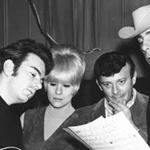
People likely assume that John Lennon and Paul McCartney wrote The Beatles’ hit “Twist And Shout”. They wrote nearly all of their music, so why wouldn’t they write this one? We can’t answer that question for you, but what we can say is that Phil Medley and Bert Berns wrote this iconic single.(The Top Notes intitially performed “Twist And Shout” in 1961, two years before The Beatles go a hold of it.)
Back to the story, both writers were incredibly influential in the development of modern popular music, yet their names are known merely by those who fancy themselves as music historians and super fans. Medley and Berns wrote “If I Didn’t Have a Dime (To Play the Jukebox)”, “Killer Joe”, “These Worldly Wonders”, and “Anything You Wanna Do”.
Aside from his collaborations with Medley, Berns was a producer, writer, and record label executive; he co-founded Bang Records with a few other colleagues in 1965. Some of the artists signed to that label include The McCoys, The Strangeloves, Paul Davis, Neil Diamond, and Van Morrison. Berns is often credited with starting the careers of both Morrison and Diamond. Additionally, some of details
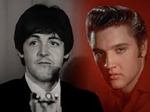
Elvis Presley and Paul McCartney are not only two music legends, but they were also at loggerheads during the height of their fame. It’s well known that during his lifetime, Elvis was not a fan of The Beatles, mainly because of their progressive politics; however, as a fellow artist, he begrudgingly admitted he enjoyed some of their music. McCartney, too, had some rather strong opinions about the king of rock 'n' roll, although his remarks remained decidedly more politically correct than the former’s. A perfect example of this is when the “Riding to Vanity Fair” singer revealed in an interview that one of Elvis’ biggest hit singles, “Blue Suede Shoes,” was, in his opinion, not better than the original. Paul McCartney Once Dissed Elvis Presley's Cover Of "Blue Suede Shoes"
McCartney, as well, had opinions of his own about Presley's music. Namely, Presley's 1956 hit single "Blue Suede Shoes." The rockabilly hit was a cover of the famed singer, songwriter, and guitarist Carl Perkins, who had originally released the song a year earlier. According to McCartney, who was a close associate of Perkins, he preferred the original version to Presley's rendition. In an interview w details

Beatlemania took over London last weekend as the capital was transformed into 1964 New York for filming. The new Beatles epic is now underway with Paul Mescal playing Paul McCartney, Barry Keoghan as Ringo Starr, Joseph Quinn portraying George Harrison and Harris Dickinson taking on the role of John Lennon.
The dramatic scenes form part of director Sam Mendes' ambitious four-film anthology charting the rise of The Beatles. First look snaps show the streets lined with screaming fans, police barricades and period details as scenes recreated the band's legendary arrival outside The Plaza Hotel.
Passers-by stopped in their tracks as history repeated itself, with London briefly standing in for Fifth Avenue at the height of Beatlemania.
Source: Gemma Jones/express.co.uk
details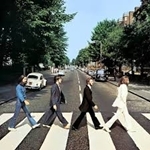
During a promotion for The Beatles’ eleventh album, Abbey Road, George Harrison picked some of his favorite tracks, including “She Came In Through the Bathroom Window,” a song Paul McCartney wrote about fan Diane Ashley, who was once hanging outside of his home in St. John’s Wood in London and eventually broke in. Harrison called it “a very good song of Paul’s with great lyrics.”
He also praised “Golden Slumbers,” a McCartney ode to finding solace in love, inspired by a 17th-century poem by Thomas Dekker, and John Lennon’s more atmospheric “Because.”
The track, featuring the Beatles’ three-part harmony, overdubbed twice more to give the effect of nine vocals, was the last song Lennon brought in during the Abbey Road sessions, and the final one recorded for the album.
Beethoven’s “Moonlight Sonata”
A classically trained pianist, one day in 1969, Yoko Ono was playing around with Beethoven’s “Piano Sonata No. 14” in C-sharp minor. Beethoven’s “Moonlight Sonata” struck Lennon, who asked Ono to play the chords backwards and started writing “Because.”
& details

It’s the song that just about everyone alive has heard. And it was one of the first songs to put the Fab Four on the map. On this day, February 1, 1964, “I Want To Hold Your Hand” by The Beatles hit No. 1 on the Billboard Hot 100 chart. It was a major first for the Liverpool band, who had previously not hit No. 1 in America before. The song entered the coveted chart at No. 45 in mid-January, and by the time it made it to No. 1 a few weeks later, the British Invasion movement was in full swing.
“I Want To Hold Your Hand” would hold that top spot for a whopping seven weeks. From there, it would be replaced by another Beatles tune, “She Loves You”. The former song, however, would stay on the Hot 100 chart for an additional 15 weeks. Today, it remains The Beatles’ best-selling single globally and has sold more than 12 million copies. The Legacy of “I Want To Hold Your Hand” by The Beatles Lives On.
“I Want To Hold Your Hand” was conceived by John Lennon and Paul McCartney at the behest of Brian Epstein. He (and their label) wanted the band to produce a song that would appeal to American listeners. It was in the basement of Jane Asher’ details

Although some fans and part press fueled the idea that The Rolling Stones and The Beatles were rivals, that was not true. Keith Richards has always been a big fan and a close friend of the members of the band. In fact, it was John Lennon and Paul McCartney who gave the Stones their first hit song, “I Wanna Be Your Man”.
In the years that followed, both bands wrote some of the most influential songs of all time and built incredible discographies. Throughout his career, Keith Richards has spoken about The Beatles on many occasions and has already mentioned two of their songs that he loves.
The 2 Beatles songs Keith Richards said he loves “While My Guitar Gently Weeps”.
“This was a guy (George Harrison) who could come out with a great song or a great record anytime. I was always wailing for some more. Let’s hope there’s more in the can. I always loved “Guitar Gently Weeps.” because that was a guitar- player thing,” Keith Richards told Rolling Stone in 2001.
Written by George Harrison, the song of course also featured John Lennon, Paul McCartney and Ringo Starr, but it is the only Beatles song to include another guitar player. It was Geor details

The Beatles’ Paul McCartney didn’t pen that many protest songs during his career. That was more John Lennon’s gig. However, Macca did pen one particular protest song that was particularly intense. And it was inspired by an event that shook Irish and English culture for decades.
That event is known as Bloody Sunday, a massacre that occurred in Northern Ireland on January 30, 1972. British soldiers shot 26 unarmed civilians during a civil rights protest, and 13 men were killed by the gunfire. Many of the victims were shot while fleeing and attempting to help the wounded.
Naturally, many people were outraged and horrified by what happened. One person who was particularly pained was Paul McCartney, who rushed to write the protest song “Give Ireland Back To The Irish” the day after, on January 31, 1972. He and Wings were in the studio to speedily record “Give Ireland Back To The Irish” by February 1, accompanied by Northern Irish guitarist Henry McCullough. The song would later be released on February 18, 1972. The Enduring Legacy of “Give Ireland Back To The Irish”
Paul McCartney’s “Give Ireland Back To The Irish” was promptly details

It’s all coming together.
The first look photos from the upcoming Beatles biopics starring Harris Dickinson, Paul Mescal, Joseph Quinn, and Barry Keoghan were released on Thursday. They were shared via photos of post cards, on the Liverpool Institute for Performing Arts’s school’s Instagram account. The school was co-founded by McCartney, 83.
“The Beatles – A Four-Film Cinematic Event,” is set to premiere in 2028, helmed by Sam Mendes. Dickinson will play John Lennon, Mescal will play Paul McCartney, Quinn will play George Harrison, and Keoghan will play Ringo Starr.
In the photos, Keoghan can be seen sporting Ringo’s signature mop and mustache. Starr, 85, has voiced support for the “Saltburn” actor.
Barry Keoghan as Ringo Starr in a dark blue polka dot shirt and patterned tie with headphones around his neck, looking off to the side in a recording studio.
During a concert for his 85th birthday, per Collider, the former Beatles drummer said that he has “spent time with him” and got the impression that the Oscar nominated Irish actor “knows what he’s doing.” But, in a July in details

When one looks back at the history of The Beatles, it was a combination of chance and incredibly hard work. The Fab Four were all from the same town and started working together when they were only teenagers, but while their success can partially be attributed to luck and talent, the truth behind their stardom is that they worked themselves to the bone in ways that would frankly be considered illegal nowadays. In 1960, when all of them were still teenagers, and George Harrison was still underage, they received an offer that would change their careers, though they didn't know it at the time.
With that mismatched lineup, The Beatles headed off to Hamburg. From the start, the band shares in the Anthology, the quest was complicated. They arrived at the club at night, and there was no one to greet them. When someone finally appeared, they were taken to sleep in the closed club. After that, they all shared a room in the backroom of a cinema for months. The band was between the ages of 17 and 20, with a drummer they didn't have chemistry with, and a bass player who couldn't play the bass. And yet, in those months, Lennon, Harrison, and McCartney became the greatest musicians in the world.
Source Val Ba details

